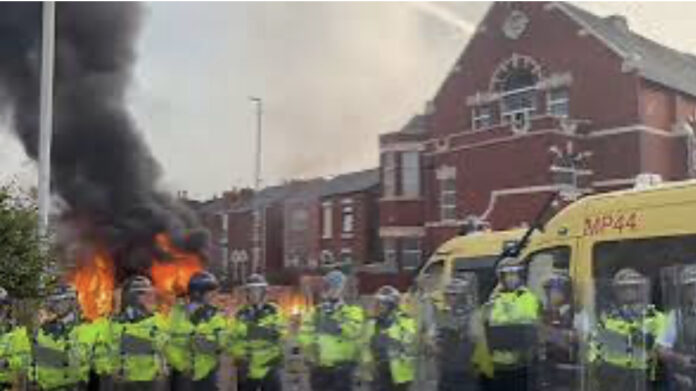The UK’s Police Watchdog is warning that forces are “ill-equipped” to deal with the risks of online content, in a report commissioned in the wake of last year’s summer riots following the Southport attack
The report by His Majesty’s Chief Inspector of Constabulary found that most forces investigated offences quickly, professionally and thoroughly, working well with the criminal justice system to bring offenders to justice.
They found no conclusive evidence that the 2024 disorder was deliberately premediated and co-ordinated by any specific group or network.
Inspectors said that it was mostly disaffected individuals, influencers or groups that incited people to act violently and take part in disorder, rather than criminal factions or extremists. And it was mainly unrelated to their ideology or political views. The causes of the disorder were complex, but the overwhelming speed and volume of online content further fuelled its spread.
But the inspectorate said that the police service simply hasn’t kept pace with the fast-developing nature of online communications. Forces need to better appreciate how fast-moving events will require them to counter false narratives online and be innovative in their approach. Policing cannot be passive when public safety is at risk.
HMICFRS found that the police service doesn’t sufficiently prioritise intelligence on disorder and that lessons hadn’t been learnt from previous outbreaks, including reacting to changing public sentiment. National risk assessments for public disorder need to be updated in response to changing threats, and the police service needs to have a better intelligence strategy or plan in place. At a time of national emergency, this plan should be clear and obvious to all.
Inspectors said that unless regulation and enforcement of illegal content is strengthened, and the capability is established for its immediate removal, the provisions of the Online Safety Act will have little or no bearing on the real-time effects of online content related to rapidly evolving serious disorder. In the context of a national emergency, once content is posted the potential harm is near instant.
Majesty’s Chief Inspector of Constabulary Sir Andy Cooke said:
“The attack in Southport which led to the loss of Bebe King, Elsie Dot Stancombe and Alice Da Silva Aguiar, was devastatingly tragic. My thoughts remain with the victims’ families and those affected.
“Following this, we saw violent disorder spread quickly across many towns and cities, with forces across the country working hard to keep the public safe. And I am sure they will agree that in the face of extensive violence, officers displayed immense bravery. Investigations by most forces were carried out quickly, thoroughly and professionally, with some still investigating crimes in the wake of the disorder. The swift work of the criminal justice system in handing down significant sentences also undoubtedly had a deterrent effect.
“The causes of the disorder were complex. Predominantly, people who took part lived locally. But the events that led to the arrests of those involved included largely overt expressions of disaffection that took place online and on the streets of UK towns and cities. Irrespective of the causes, those involved cannot be excused for their actions.
“The police service needs to learn lessons from previous outbreaks of disorder; it should not be caught off-guard again. It needs to develop a more cohesive intelligence network that informs and supports the police response to simmering tension and unrest.
“I must reinforce the importance and value of neighbourhood policing. As officers establish positive relationships with communities, they develop a deeper understanding of people’s sentiments and feelings. But the emergence of virtual communities, who use social media and other online platforms as their main method of communication, has created additional challenges and demands for policing.
“Forces must be able to deal with the consequences of harmful information that spreads rapidly online. It’s vital that the legislation, regulation and enforcement of illegal online content improves to support this.
“I am disappointed that the police service has still not held a national debrief to learn lessons, over nine months after the disorder happened. Inaction detracts from the good work the police did during the disorder, and it harms the service’s reputation.
“The findings and recommendations from this review are only a starting point. I urge forces to learn from these events, and act now to strengthen their response to future instances of disorder and make sure the public are kept safe.”







